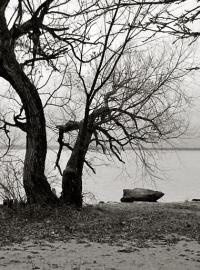|
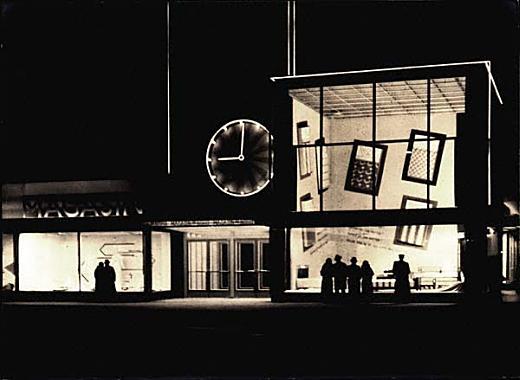
Magasin du Nord of Copenhagen
An Eye for the World
Shotaro Shimomura
1934-1935
The American Museum of Photography
_______________________
We'll Leave a Light On
Tom Clark
Without it, what savage unsocial nights
Our ancestors must have spent! All those deadly
Winter nocturnes in caves and unillumined icy
Fastnesses: they must have laid around and
Grumbled at one another in the dark like the blind,
Fumbling each other's features for the wrinkle of a smile.
What tedious repartee must have passed! Perhaps
This accounts for the dullness of much archaic
Poetry, whose somber cast is notorious and must
Have derived from the traditions of those
Long unlanterned nights. Jokes came in with candles.
(....)
Wasn't it by the midnight taper all writers once digested
Their meditations? By that same light we ought
To approach them, if we ever expect to catch
The tiger-moth of inspiration that dances
In the word incandescent.
...(more)
_______________________
Three Poems
Helen Macdonald
conjuntions
Morphometry
(....)
I had an idea of this, is stacked with song
& cool blood, bruised with salad herbs & oil
Of petrae, callt oil of peter, salts, flats, larks.
Wet feathers continue to rise in my breast
Whereas your darker plumes operate a weak tacet
broken in twain, se muer, to moult & speak for a hope
For a moment or two for the pile of the land rocks back
in a dubitable movement shiny as a climate sere
As desert, it is all flush. Through a miracle of hatred
an expansion of range will serve, as light in itself;
Light and even as absolutely nothing else is.
But not wanting to wander across interior spelts
Inclined to bruise it as the pelf of good fortune, love.
To rack the head with love. A removeable locus of bloody
and clouded leaves is politic & linear upon that phrase
Weighing classically so that the thought forgets itself
with difficulty. At once removes a tiny sphinx of tin
a shy and discreet creation, doubtless fussed by thin shadows
of bent sinew & pneumatised bone, my heart wilted in them
Home. ...(more)
_______________________
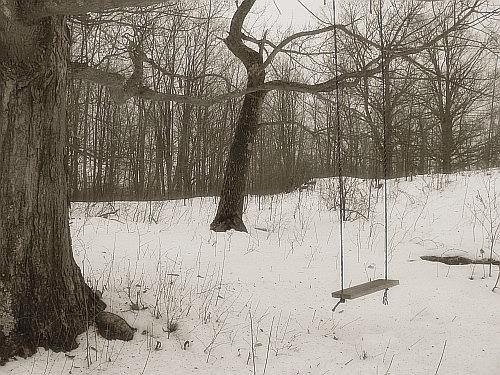
photo - mw
_______________________
There was a time when I sat on the edge of my bed and thought of the future, what it would bring, how my drive in the present would unfold into a fulfilment of desires. Now, grey-haired, I sit on the edge of my bed and cannot think of anything I desire, of a desire I can sustain.excerpt
World of Dust
Joel Biroco
Coronzon Press
_______________________
Image [&] Narrative
part of Open Humanities Press
The Pre-Narrative Monstrosity of Images: how images demand narrative
William Brown
Abstract:
André Gaudreault (1990) has pointed out that early silent cinema screenings required a narrator in order to help audiences make sense of the images that they saw. Soon after, filmmakers began to adopt narrative techniques in order to tell stories – leading to the predominance of narrative within film production. Gaudreault has differentiated the presentation of images in early silent cinema from narration by calling it ‘monstration’. That is, simply ‘showing’ images. Jean-Luc Nancy (2003), meanwhile, has argued that all images are ‘monstrous’: that is, images are incomprehensible to spectators, in that they lie outside of meaning. Or rather, they do not lie outside of meaning so much as before meaning. Images are monstrous because upon initial viewing they do not make sense. In this way, images are pre-sense, they are present.In this article, Brown will combine Gaudreault and Nancy’s ideas through their shared use of the term for showing, monstration. Brown proposes that images do indeed pre-exist narrative, but that they simultaneously demand narrative in order for us to make sense of them. Given the monstrous nature of images, narrative in effect serves as a coping mechanism for consumers of images, who need various narrative techniques (film narrative, spoken words, text alongside the image, or even texts relating to the images that circulate more widely, as well as theoretical frameworks themselves) in order to make sense of images. Narrative always comes after images, and images therefore exist pre-narrative.
Introduction to The Story of Things: reading narrative in the visual (part 2)Image [&] Narrative Vol 12, No 4 (2011)
Part 1
Image [&] Narrative Vol 12, No 3 (2011)
_______________________

On the Needles of These Days
Jindrich Styrsky
Photographs, 1934-1935
_______________________
Architecture Philosophy Vol 1, No 2 (2015)
The Myth of Autonomy
Nathaniel Coleman
(....)
Ultimately, the aim of this article is to recover a critical-historical perspective that reveals the project of orthodox modern architecture eschewed by autonomists as itself an earlier response to the same persisting disciplinary crisis that animates their efforts. Following on from this, Utopia is reintroduced as providing architects with a much more promising set of tools for redeeming architecture than autonomy ever could. As I will argue, the most significant contribution Utopia can make to architecture is to return the social and political to it, which also provides a way to resist the formalist pull of autonomy. Renewal of Utopia, and with it the social and political dimensions of architecture, inevitably reveal(s) autonomy as a myth invested primarily in the dissolution of just such a possibility. The great paradox of autonomy in architecture is that it is duplicitous, using the inevitable impurities of realization as a cover for impossible desires for purity as a means to liberate architecture from its obligation to communities. The apparent naiveté of the modernist project as one of engagement, as interpreted by architects such as Aldo van Eyck, is discarded in favor of disengagement as apparently the only realistic response.
(....) _______________________

Jindrich Štyrský
1899 - 1942
_______________________
Some Interpretive Puzzles within Seriality [pdf]
Rachel Blau DuPlessis
Rather than write an analysis of one serial poem or poem sequence here, I’d like to disaggregate
(and thereby complicate) seriality as one of the forms, modes, rhetorics and practices of radical
poetics. It is overgeneralizing, after a half century or even more, simply to say “poem sequence,”
“field poetics,” “seriality” or “page space” (as if these each indicated one single distinct mode),
because that overlooks their multiple histories, different points of origin, and various functions.
Discussing disaggregated formal ideas would mean pursuing various genealogies, clashes,
debates and fusions of the modes in question, as well as examining various poets’ plural
justifications in poetics, analyzing alternative explanations for their uses of one mode, and
discussing biographical and socio-aesthetic meanings. I don’t assume that poems and poetics are
seamless expressions of each other—far from it!—but I became curious about the multiple uses
of a term “serial poem” within what is taken, generally, as “one” poetic movement—the
Berkeley or San Francisco Renaissance. These notes begin to look at some of these questions.
The serial mode certainly has prestige—but should we call it a genre, a form, a practice, a
product? How can this mode be distinguished from sequence poems—if it can? I will simply
note that to follow through completely on this set of questions, I would have to engage Joseph
Conte’s Unending Design: The Forms of Postmodern Poetry (Ithaca: Cornell University Press, 1991), an essential “go-to” book for this material.
....
The Sequence: Essays in
Blackbox Manifold No. 15 (Winter 2015)
_______________________
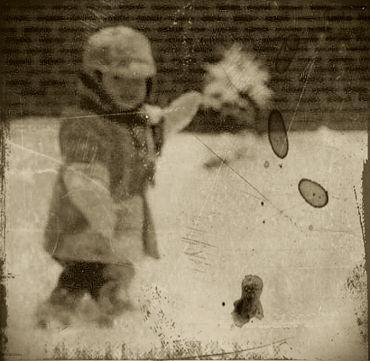
myself c.1952
before acquiring a mind of winter

photo - mw
_______________________
The Book of Delusions (chapter 5) [pdf]
E. M. Cioran
translated with an introduction by Camelia Elias
(....)
—Just like when during daytime, when we close our eyes to immerse ourselves in the sudden darkness we discover points of light and bands of color which remind us of the other part of the world, when likewise we descend into the vast and dark depths of our soul, when what is revealed onto us, in the margins of darkness, we find the reflections of an unsuspected golden world. Can these reflections be a calling to our soul or a regret?
—Although space resists us more greatly, more directly and more fatally, it is nonetheless a less essential problem to us than time. Space never becomes a problem of existence or personal relationship. The more we immerse ourselves within our ego, the more space loses its reality, because time persists in our consciousness, and when we have become essentials we move further and further away from time as we did from space.
Space doesn?t give us an intimate feeling of relativity; it only makes us seemingly reflective, on the outside. There are people and even cultures (the Egyptian) who perceive eternity as it is bound up with space, and who do not feel time and its relation to eternity. In their consciousness non-motion and the boundlessness of space exhaust the essential content of the world.
Space overwhelms us; but it doesn?t go through us, even though we are closer to it than we are to time. Only time goes through us, only time leaves us awash, only time do we feel as belonging to us. Time discloses music and music discloses time to us, just as space unveils plasticity to us. But between the plastic and the musical, what soul goes for the first? ...
_______________________
Poets Online Talking About Coffee: XLIV - IL
Max Ritvo
berfois
Before her coffee, my mom was all body and no voice. She’d walk to the kitchen in silence, looking extra thin. Like many people, she wouldn’t make eye contact, and only spoke in a grumble. My mother was very sick when I was a child, and I felt this most strongly in the morning. Her little body was never the source of her strength—it was her voice, the vowels pricked open with a bright Israeli hook, that would pull the entire day out of thin air, as she’d dictate play tasks, writing and drawing projects, the meals I ate, and the pretty clothes I wore. I’d sit with her at the table, silently gazing into the eye of my egg, and then suddenly the coffee cup was empty and Mom was flushed with color, the arms of her cloud pajamas waving like flags under a magic wind.
This was my first experience with a chemical changing a human being. And the chemical was perfect. She never suffered as a result of the coffee, the transformation took place instantly, and lasted all day. I think I thought all chemicals would work like this.
...(more)
_______________________

Cassiopeia 1
1960
Joseph Cornell
1903-1972
_______________________
Beginning ‘We the Migrating They’
Nathaniel Mackey
Blackbox Manifold
—andoumboulouous étude 2—
We the migrating they they
said come see, lean though
we did and look, sort of see,
night sky no less remote.
They
were the stars, we the stars’
understudies, night’s
love love’s lit recompense,
night’s far fetch a black
well
dipped into, horns’ bells
burrowing in… Would-
be recompense. Ythmic
largesse… Far fling as if all
touched other, we their
press
outward unimpelled…
They
the open sea and we the raft
I clung to, left leg scissored
by hers, we lay ensconced,
we
within the we they elicited,
ours newly raveling out…
Not to be attached we told our-
selves, ratchetless advance
we’d
come abreast of lip to inquis-
itive lip, tongue to ingenuous
tongue… Lift it otherwise was
no
matter, we drew back, we’s rum-
maging they let go. An exercise
in touch it turned out to be, we
their would-be stand-in, pre-,
post-,
pan-pronominal consort, to see
ourselves we set ourselves adrift…
Curve and declivity. Protuberant
hip…
Immanent ether. Astral dispatch…
They light’s arrival’s delay, we
their someday stand-in, ages we
took
to reach them, we the migrating
they…
That they were roots in the sky
moving's muse insisted… Star flux…
Far
star… Far fix
...(more)
_______________________
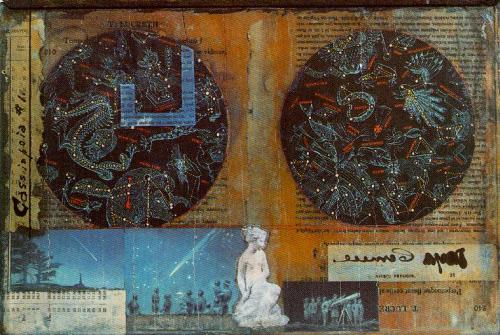
Cassiopeia 1 (Verso)
Joseph Cornell
_______________________
enthusiasm
Richard Marshall reviews Steven Fowler, Enthusiasm
3am
How does fertiliser help the bomb?’ Fowler’s ripe question.
Ask what, or who, where, time, city, rural encampment, rubble shack, the evaluation at the abyss or in the long run, sans calculation, algebra, logical filigree, ask what epistemic holy ghosts hissing like a hot philosophical lava miniaturise with poetry. So starts Fowler’s new collection, a ‘golden horde of disabled will’ where the clues ask around for what might be tagged a surveillance of change – change of mind, heart, feeling, rationality, calculation, then gadget technologies dressed as learned prim theologies of rationality, or other kinds of monkey stuff. What’s the fertilizer, we ask? What the shit? TS Eliot produced the ur-poetic gadget for digging it out and spreading it, raiding Frazier’s junk anthropology for faux metaphysic slurries, shimmering it around so the muck eventually calibrated different degrees of an idealization where limit of memory, history, psychological backdrops, sheer physical stamina in the pen, camera, digital peg, imagination, future, hope were disguised and rendered a ‘Wasteland’. This ability to make material idealise into something transcending our actual epistemic situation fools some into thinking we actually have transcended it, suggesting there is some metaphysical substance holding the fall of words and thoughts to account, epistemic holy ghosts hissing like a furnace baked philosophical depth bomb.
Fowler’s too wise to make that mistake. He works in the limits of what he calls, as an abbreviation for the complexities, ‘enthusiasm.’ .....(more)
_______________________
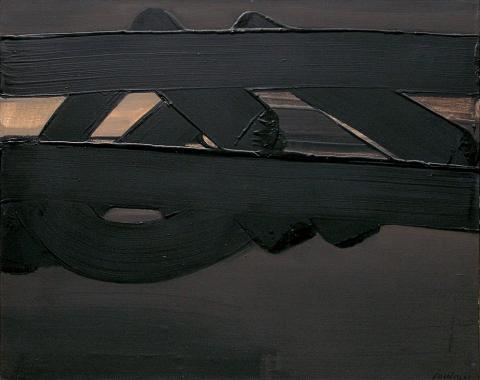
Pierre Soulages
b. 1919
_______________________
Barbarism or Barbarism?
McKenzie Wark on Isabelle Stengers, In Catastrophic Times: Resisting the Coming Barbarism
(....)
Not much can be expected from what Stengers calls the guardians, and they know it. Whether elected or appointed, the guardians simply manage a state of “cold panic.” Their exhortations aren’t even coherent: keep consuming but be ‘green’ about it! They have lately added schools and universities to the list of institutions to be broken up for kindling and fed into the boiler room of commodification. Even there, open ended inquiry and collaboration is getting harder. Interestingly, Stengers thinks that rather than denunciation the guardians deserve even less: laughter, rudeness and satire.
(....)
The very terms of public debate are set in advance by what is in the interests of what Stengers calls the Entrepreneurs, or what I would call the vectoralist class. “What has been conquered for all has been redefined by categories that are addressed to whoever, categories that produced amnesia and which are then vulnerable to the infernal alternatives concocted by capitalism.” Nobody’s particular needs or interests or desires are taken into account. The state maintains public order; the Entrepreneurs maintain a right to responsibility. Between them they generate a hostility to paying attention.
And so what needs to be collectively reclaimed is an art of paying attention, something with which the state can’t help. We need consensual narratives about what is supposed to matter. Stengers highlights the narrative of the ongoing enclosure of the commons. The so-called knowledge economy – what I would call a vectoral rather than capitalist mode of production – erases the line between public and private research. The state lets the vectoralist class appropriate public knowledge production, while making the state responsible for enforcing its version of ‘intellectual property.’ Or as in the case of the Trans Pacific Partnership and similar treaties, creates para-state formations to do it. There’s a need to invent new modes of resistance to enclosure.
(....)
The enemy of both humanistic thought and the open inquiry of the sciences is a kind of stupidity. This now even affects the rentiers who defend the enlightenment, who really defend privilege, and have lost all sense of adventure and risk. (Stengers gives no examples, but I can’t help thinking of the sad trajectory of Richard Dawkins.) Rather than critique which claims to see through to the root or the essence, or to ground everything else in an ontology of first things, Stengers like Deleuze prefers the world of second and third things, of thinking through the middle, or the milieu.
It is a time, then, for minor knowledge, which questions the order words of Promethean modernization. The guardians keep the floodgates – as they see them – closed to questioning. We have to learn to pose our own questions. And refuse the answers when the questions to which they answer are answers for nobody, for whoever, rather than answers for us. And all that without investing too much faith in one or other belief that we know what we’re doing: “… it is not a matter of converting us but of repopulating the devastated desert of our imaginations.”
...(more)
In Catastrophic Times: Resisting the Coming Barbarism [pdf] Isabelle Stengers
Translated by Andrew Goffey Open Humanities Press and Meson Press
_______________________
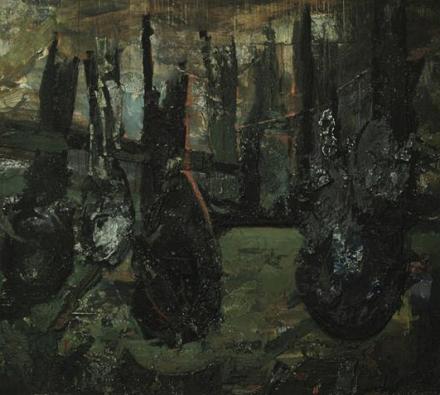
Lucio Muñoz
1929-1998
_______________________
from
Notes Toward a Supreme Fiction
Wallace Stevens
VII
He imposes orders as he thinks of them,
As the fox and snake do.It is a brave affair.
Next he builds capitols and in their corridors,
Whiter than wax, sonorous, fame as it is,
He establishes statues of reasonable men,
Who surpassed the most literate owl, the most erudite
Of elephants.But to impose is not
To discover. To discover an order as of
A season, to discover summer and know it,
To discover winter and know it well, to find
Not to impose, not to have reasoned at all,
Out of nothing to have come on major weather,
It is possible, possible, possible.It must
Be possible.It must be that in time
The real will from its crude compoundings come,
Seeming at first, a beast disgorged, unlike,
Warmed by a desperate milk.To find the real,
To be stripped of every fiction except one,
The fiction of an absolute— Angel,
Be silent in your luminous cloud and hear
The luminous melody of proper sound.
VIII
What am I to believe?If the angel in his cloud,
Serenely gazing at the violent abyss,
Plucks on his strings to pluck abysmal glory,
Leaps downward through evening’s revelations, and
On his spredden wings, needs nothing but deep space,
Forgets the gold centre, the golden destiny,
Grows warm in the motionless motion of his flight,
Am I that imagine this angel less-satisfied?
Are the wings his, the lapis-haunted air?
Is it he or is it I that experience this?
Is it I then that keep saying there is an hour
Filled with expressible bliss, in which I have
No need, am happy, forget need’s golden hand,
Am satisfied without solacing majesty,
And if there is an hour there is a day,
There is a month, a year, there is a time
In which majesty is a mirror of the self:
I have not but I am and as I am, I am.
These external regions, what do we fill them with
Except reflections, the escapades of death,
Cinderella fulfilling herself beneath the roof?
(....)
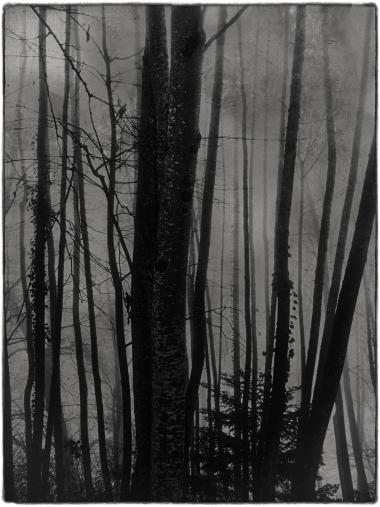
In the loneliness of the woods
LE CONTRAIRE ET SON CONTRAIRE
Etienne Cabran
via arsvitaest
_______________________
CAMBRIAN
A Sequence About The Sea And Creatures
Eeva-Liisa Manner
1921 - 1995
translation by David McDuff and Hildi Hawkins
presented by flowerville
(....)
To go, to go without taking hold of anything
through dirt and snow, alternating heat
and harsh past and ice age,
that which was, and that which is to come;
to sleep in the snow and make a melt-hole with one’s body
in the great common ice-field,
to learn the skill of hands, slow hope,
to build a house from sticks and let the rains come,
to find a worn path and kicked stones,
the mute density of stone; also people,
and to hate one’s neighbour as oneself;
to eat pine cones and the food of birds,
to share one’s meals with the animals
and learn their parables and language and rapid footprints.
To learn their parables, and confuse them with bodily things,
to learn the secrets, and forget them again,
to lose knowledge
on the journey through time and layered records,
obscure stone books and missing dynasties.
To become empty and give up superstition, belief
that is wisdom, inherited from the animals,
from all anguished hearts
and from bound plants before turning into animals.
To become empty and to give up -
how heavy is the journey without a burden,
the loneliness without the company of the beasts,
the difference that the wolves flee and fear.
(....)
V (O DARKNESS)
If they wanted freedom
the earth’s, the sea’s creators, the slow birthgivers,
then why did they draw not birds
but fish, bladderwrack, sea-sponges, the undersides of feet,
rat, musquash, for which traps are set,
and pedestrians with choking lungs
and brains, that branch like coral
and know no more.
O darkness, which swallows everything; animals’ cries for help
that are dragged slowly through creation;
what God created this deformed Grace? was it God?
what God created these deformed people? was it Satan?
people, greedy for Grace, cruel to animals,
great in Reason, small in Mind.
Pray for the animals, you who pray,
who beg for Grace, Success and Peace,
into them, too, has flowed the immanent Spirit,
they too are souls, more whole than you,
and clear, brave, beautiful;
and if we begin from the beginning, who knows,
we shall be able to share these sufferings, too,
simpler, harsher, more infinite than ours.
...(more)
Eeva-Liisa Manner -- from This Journey [Tämä matka] (1956)
_______________________

Woman with Leaping Cat
1945
Robert Colquhoun
b. Dec. 20, 1914
_______________________
A Dream of Winter
Dylan Thomas
Very often on winter nights the halfshaped moonlight sees
Men through a window of leaves and lashes marking gliding
Into the grave an owl-tongued childhood of birds and cold trees,
Or drowned beyond water in the sleepers’ fish-trodden churches
Watching the cry of the seas as snow flies sparkling, riding,
The ice lies down shining, the sandgrains skate on the beeches.
Often she watches through men’s midnight windows, their winter eyes,
The conjured night of the North rain in a firework flood,
The Great Bear raising the snows of his voice to burn the skies.
And men may sleep a milkwhite path through the chill, struck still waves
Or walk on thunder and air in the frozen, birdless wood
On the eyelid of the North where only the silence moves,
Asleep may stalk among lightning and hear the statues speak,
The hidden tongue in the melting garden sing like a thrush
And the soft snow drawing a bellnote from the marble cheek,
Drowned fast asleep beyond water and sound may mark the street
Ghost-deep in lakes where the rose-cheeked nightmare glides like a fish,
The Ark drifts on the cobbles, the darkness sails in a fleet,
Or, lying down still, may clamber the snow-exploded hill
Where the caverns hide the snowbull’s ivory splinter,
Fossil spine of the sea-boned seal, iceprint of pterodactyl.
Oh birds, trees, fish and bears, singing statues, Arkfloods and seals
Steal from their sleeper awake as he waits in the winter
Morning, alone in his world, staring at the London wheels.
_______________________

photo - mw
_______________________
Wangfujing - Summer Palace
Yang Lian
translated from the Chinese by Brian Holton
a breeze splits the spring spate
though it's the greenest for a millennium
coquetry set with every jewel of the concubine who threw herself in the well
on the lake's drifting face
a jade cup filled with poison wine
the emperor separated by a screen of empty words softer than gossamer
the beauty of dying in jail too elegant
too noble
too decadent
with a gesture the princeling loses to the slave
kneecaps in the rutted knee-worn mud ooze tenderness
the sound of the wind nips out the palace wicks one by one
exit the Gate of Eastern Glory
the final syllables of Mei Lanfang's sweet voice
swing him into
the last dynasty's crab-apple blossom and cypress groves
follow parallel lines of red-tiled walls that rhyme with toppling
it's the century releasing the shutter
the soul in the photo
blinks
sucks up the dark that soaks into every f-stop
history's tourist map misses its step
seductive as the innermost heart
inverts the untrue crowd that is controverted by a single crow
exit the Gate of Divine Might
pedlars hawk the gloaming
a tuning fork hidden in the camera's body startles
the lakeshore's curve
the drowsiness of lotus blossom
Realising spring Pavilion
exchanged for a gunboat
(who wrote it?)
gladsome wind chimes'
range further out
weeping willow strings stroke the cold of the waves
the Empress Dowager's attentions
dared to resist the sceptre
if that's possible
and have attended to him in the womb too
punishing the faux-ivory sky
concealed bird claws on dusky water invite
his catkin to welcome another time
hurriedly snatched away
The Wolf 32via The Page
_______________________

Missing that old tree
Etienne Cabran
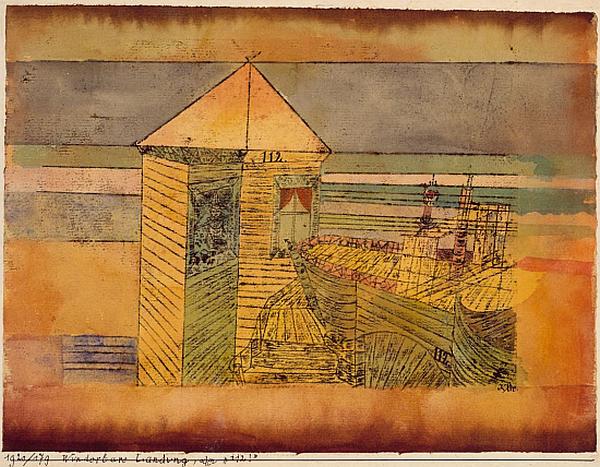
Miraculous Landing
1920
Paul Klee
b. December 18, 1879
_______________________
BOMB 134, Winter 2016
John Wieners's Supplication: Selected Poems and Stars Seen in Person: Selected Journals
Patrick James Dunagan
For BOMB’s fall 2015 issue Alice Notley spoke with Robert Dewhurst, mentioning how when she brought up the work of John Wieners at a class she taught at Poets House “no one [ . . . ] knew who he was, which was amazing; he disappeared from the radar.” That state of affairs is now about to change. Dewhurst, along with Joshua Beckman and CAConrad, have edited Supplication: Selected Poems of John Wieners for Wave Books, putting Wieners’s work prominently back into print, ensuring that his name will soon ring bells both inside and outside of many a poetry class. At the same time, City Lights has published Stars Seen in Person: Selected Journals, which offers already dedicated readers of Wieners, such as Notley, a heretofore unpublished cascade of fairly clandestine prose and poetic sketches covering the first fifteen years of his life as a poet.
...(more)
_______________________
A Translation of "Ein junger Schriftsteller"
a 1965 Short Story by Thomas Bernhard
Douglas Robertson
A Young Writer
Today I was prevented by the local police from making progress in my scientific work
and at the moment it seems to me that thanks to an intervention every facet of this work has been destroyed; entire mountain-ranges have vanished from the terra firma of my thought thanks to the uncouthness with which I was torn away from my books and texts and escorted to the police station; entire tracts of land have been simply obliterated. Now again, as I was a year ago, I am merely a man groping in the dark. My understanding is a wage slave of madness. In this handful of hours dictated to me by our melodramatic police a colossal deterioration of my researches and my physics has occurred. –It is all centered on the young writer who vanished several weeks ago and whom the public (the police) are implicating in the assassination of the foreign minister. It is a good thing that the man is finally dead, but it is ridiculous that the writer, the very person who has caused quite a sensation in our immediate neighborhood with a handful of books, the author of Sthenia and Asthenia, is being associated with a political event, any sort of political event; theforeign minister, the social democratic bugbear, with the thirty-year-old who wrote The Forest in March! .......(more)
_______________________
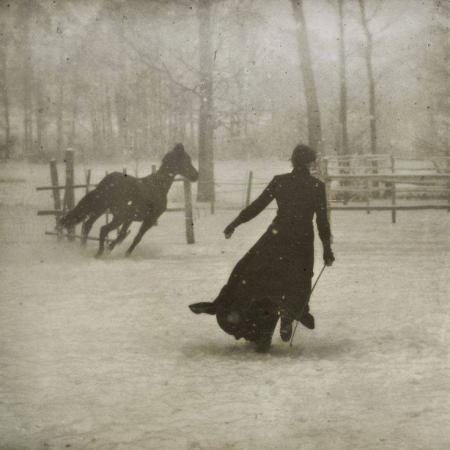
Undated. Unlocated. Unattributed.
via arsvitaest
_______________________
Poetry by Joseph Donahue
The Secret History of Secrets
(....)
… a film is playing: a dividing
line on a highway races by;
yellow stripes disappear
under the front of the
questing car. Headlights
flash across briars and
a spit of winter grass like
a wind that exalts our spirits
at the merging of the high
branches with the stones
on the stream’s bottom and
the clouds, the drifting leaves,
the shadow of the one who
is filming, caught in the flow,
as if we are always a split second
ahead of our own thought,
so that the past is right “there,”
lived again in the ripple.
An early morning, long ago,
a corral, a man walks the horse
towards you, you have never
seen a real horse, the man
says the horse is old
and gentle; to you, he is
huge and magnificent. The
horse is breathing steam.
You reach up and touch the
bristle and quiver of his neck.
The sun has barely come up.
You feel him seeing you.
Then you are lifted up,
set in the saddle, the
shudder of the hoofs
rises up through you,
smell of leather and hay; the
dawn is chilly, but your pulse
kept your blood rushing.
Warmth flows into you
from the sun, from the
great beast that bears you,
and fear, and delight, as
the head dips, and grazes.
In the stillness the fields
rush out and away.
...(more)
Voices on Joseph Donahue
Edited by J. Peter Moore jacket2
Joseph Donahue's 'bowls of memory'
Marjorie Perloff
In a recent interview with Jon Curley (The Conversant, April 2014), Joseph Donahue calls our attention to two lines from Emily Dickinson’s short poem “The spry Arms of the Wind”:
I have an errand imminent
To an adjoining Zone —
“Each of those terms,” says Donahue, “‘errand,’ ‘immanent,’ ‘adjoining,’ and ‘zone,’ have for many, many years deeply engaged me. … the mixture of vocation, of meaning embedded in the material, of boundary, and of expanse, are a clarion call. … Where are those zones? What awaits there? Who would one be were one to go there and come back?”
There’s a revealing error here: Donahue inadvertently reads “imminent” as “immanent,” the latter word designating the manifestation of divine presence inherent in the material world (as opposed to transcendent). But why not read Dickinson’s “errand imminent” — her urgent errand — as a longing to discover the immanent? Donahue has always been concerned with the spiritual dimension of material existence: he is, that rare thing today, a seriously “religious” poet. I want here to look at how this poet’s “errand imminent (immanent)” to those “adjoining zones” works in the opening poem of his new collection, Red Flash on a Black Field (2014).
...(more)
_______________________
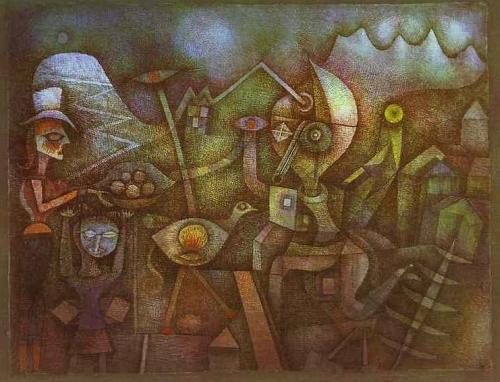
Carnival in the Mountains
Paul Klee
1924
_______________________
Tying and Untying the Knot:
Kafka and Milena on Marriage, Jewry and History
Jeffrey A. Bernstein
Franz Kafka was no stranger to fear and anxiety—his works radiate them. Yet his oeuvre is not simply a catalogue of the terrifying and traumatic situations that can befall humans. If (as he indicates in an unpublished notebook) Freud’s writings about anxiety serve as the Rashi for modern Jews, Kafka’s own work is most assuredly their Nachmanides; the latter took himself to be in constant dialogue with the former, always alchemically transforming Rashi’s seemingly concrete Torah commentary into allegories that lead in secret, mystical directions.[1] So just as we wonder how the rabbinic commentators made use of their own past experience, we have to wonder what gets registered in Kafka’s accounts of fear and anxiety.
What, in the end, was Kafka so worried about? Basically, everything: women, marriage, health, travel, family, Judaism, tradition, even writing. And he wrote in detail about all of these things. Most of the time—in the stories, in his three novels, and in the journals and letters, these worries simply overwhelm the reader and/or interlocutor. Kafka’s biography has been viewed as the site of many undesirable traits, such as his ambivalence towards Judaism (a faithless religion based on calculation), and his treatment of women (engaged twice but broken off out of narcissistic anxiety). What no one disputes is his brilliance at registering the anticipatory difficulties facing any thinking individual in simply getting through a day. If Kafka was a self-hating Jew, he showed that self-hatred emerges from legitimate doubts. And if he was a mansplainer, he showed his female interlocutors (if there was any doubt on this score) how such a ‘practice’ oftentimes derives from pathological fears of engaging in women as equals.
...(more)
_______________________

Gespenst eines Genies
(Ghost of a Genius)
1922
Paul Klee
_______________________
From Róbert Gál, Signs and Symptoms
Spurious
(....)
A diary entry: 'To grasp time as a summons, for one may burrow into memories. To grasp space as a cult zone. To find correlations. Not to seek, but to find. With discrete steps forward to predestine one's path'.
The meaning of life is what remains when life loses its meaning.
...(more)
_______________________

Pavillion
Paul Klee
1927
_______________________
Where Every Hollow Holds A Hallow
JosephDonahue
I sleep in a tree. At night,
the tree flies to a beach where
the pebbles are gems.
Thunderclap: the moon
in bits. An office,
a chair in front of a desk,
a hitch in the interview: your
advocate, it seems, is a Nazi.
Nervosina, in the well of a pillow,
who now whispers my name?
The sky’s a dirty sponge.
The earth, a bucket.
A billing fiasco looms.
...(more)
|
